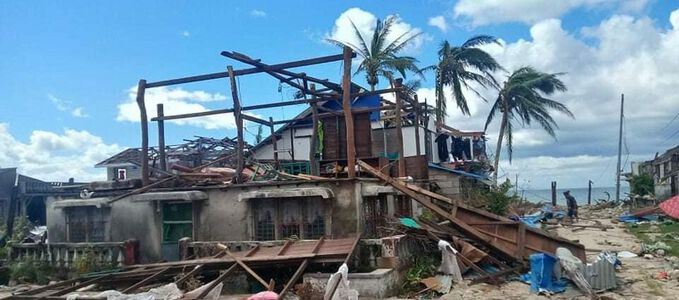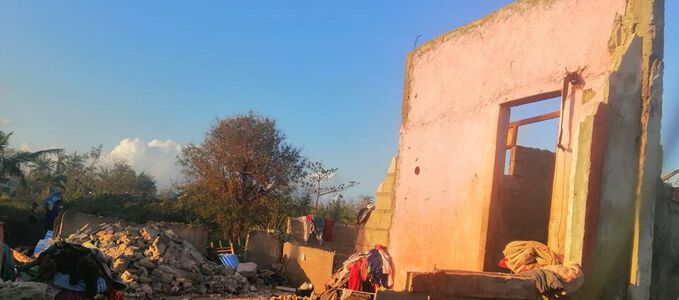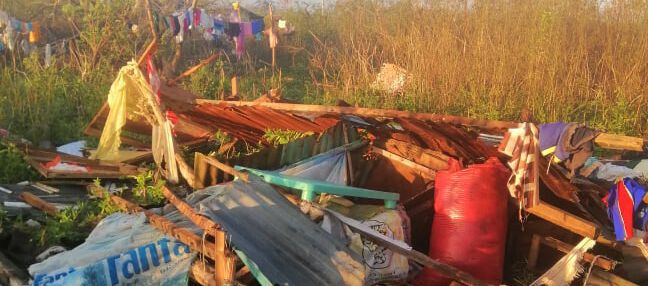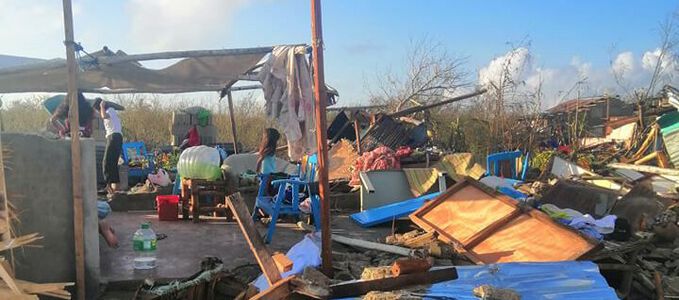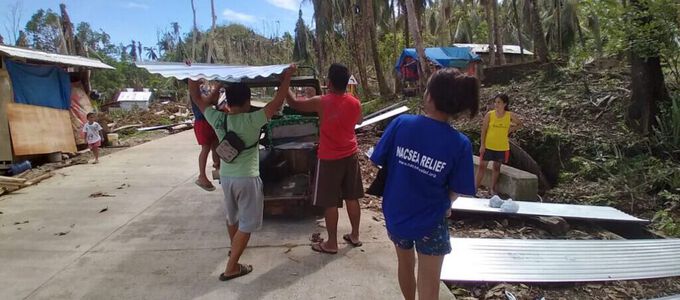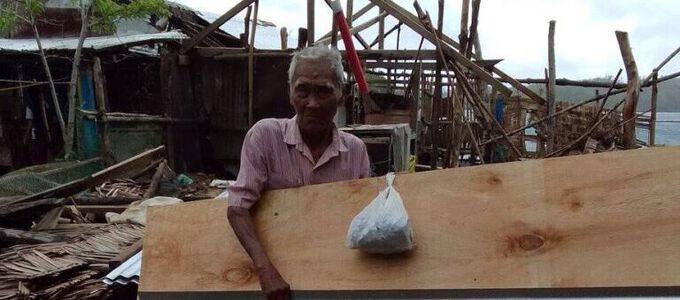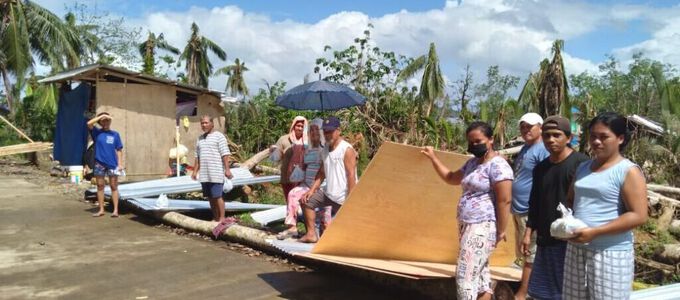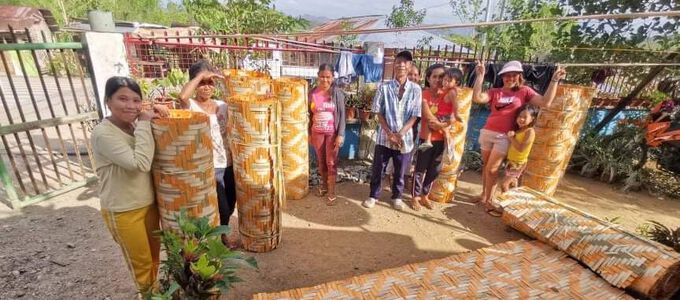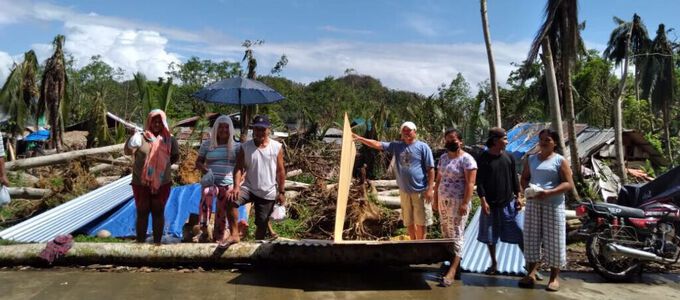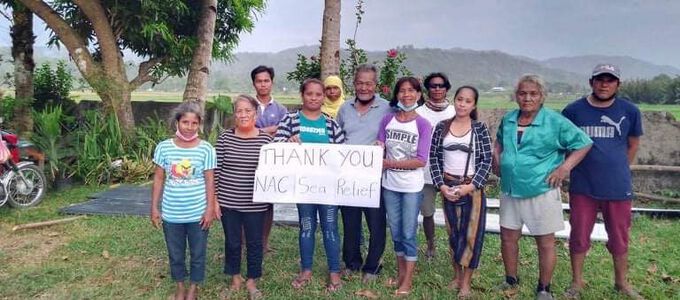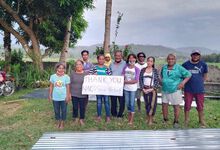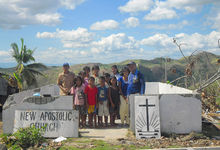Typhoon Odette: charities join forces
“We have realised that there is no end in sight to this calamity.” This is how the charity of the New Apostolic Church in the Philippines describes the situation after Typhoon Odette devastated parts of the country. Among the many NGOs that have responded are also four New Apostolic charities.
16 December 2021: a typhoon makes landfall on the island of Siargao, bringing torrential rains and leaving devastation in its wake. The typhoon moves through the archipelago until the next day, 17 December, making landfall a total of nine times in different parts of the country. The storm sweeps through 11 of the country’s 17 regions, leaving a swath of destruction.
Typhoon Odette (internationally known as Typhoon Rai) received little media attention and the extent of the destruction was initially underestimated. In the meantime, however, it is clear that the damage is even greater than that caused by Super Typhoon Haiyan, which struck in 2013.
A grim picture
“We are looking at a major humanitarian crisis,” reports Ansherina Talavera, manager of CARE Philippines: “We are seeing hundreds of thousands of people displaced, and roads and power lines have been washed away.” Schools, hospitals, and other buildings have been destroyed, 1.9 million houses have been damaged, and more than 427,000 houses completely destroyed. “Access to some of the worst affected areas, particularly remote islands, remains a big concern due to destroyed private and public sea vessels.”
Heavy rains caused floods and storm surges in some areas with landslides blocking major roads and highways and destroying hospitals and airports, making these regions inaccessible even by land and air. The storm washed away power lines and took down mobile phone masts. Some regions are still without mobile phone reception, internet, and electricity, and are therefore completely cut off from the outside world.
People are struggling to access food, as markets are disrupted, food prices are rising, and their agricultural land has been destroyed. Many Filipinos have had their livelihood destroyed. Since the outbreak of the Covid pandemic in early 2020, countless people who had lived off tourism had already fallen below the poverty line.
Volunteers at work
Charities such as CARE Philippines, which works closely with the coordinating organisation OCHA (United Nations Office for the Coordination of Humanitarian Affairs), are supporting the local population.CARE and its international and local partners are cooperating with the Philippine Coast Guard and the Department of Social Welfare.
First of all, people in the affected regions have to be provided with everyday essentials: food, safe drinking water, medicine and hygiene items, household items such as solar lamps and equipment for cooking meals, and shelter. Then the houses and infrastructure can be rebuilt.
OCHA faces a number of challenges: the poor food situation is leading to malnourishment and nutritional deficiencies, which in turn causes disease. The country was already struggling, following a hard year battling Covid-19. It was one of the worst-affected countries in the Asia-Pacific region. And now it is being threatened by a new health crisis. And not only that. Odette disrupted schooling for millions of children. This followed two years of intermittent pandemic-related school closures. With many schools damaged, children cannot go to school and are limited in their development. Also the transport and logistics of humanitarian aid is a real challenge without power or telecommunication.
However, OCHA has an emergency and reconstruction plan. It hopes to raise 169 million dollars to help at least 840,000 particularly vulnerable people. This is why it is launching an appeal for donations.
New Apostolic charities join forces
Shortly after Odette struck, brothers and sisters less affected by it set out to help their fellow human beings. NAC SEA Relief, the charity of the New Apostolic Church South East Asia, distributed emergency food packs and coordinated relief efforts. In February then, the charity was able to supply people with urgently needed building material for rebuilding their homes: plywood, cement, corrugated iron sheets, nails, and steel poles.
Other New Apostolic charities are providing funds: NAK karitativ (NAC Western Germany), human aktiv (NAC Southern Germany), and NAK Humanitas (NAC Switzerland). Together the four charities have already raised 80,000 euros, which will go towards helping victims of the typhoon. NAC SEA Relief has already distributed more than 1,200 emergency food parcels, containing rice, fish, meat, pasta, coffee, and sugar. However, this is only enough to feed a family for one week. Then they need further assistance.
Reconstruction and rebuilding is also on the agenda. Together the four charities want to help the people in the Philippines rebuild their lives. Once the emergency response is completed, houses will be rebuilt and farmland recovered. “The first priority is to rebuild homes, because the rainy season will start in a few weeks, and families will then need a roof over their heads again,” explains retired District Apostle Urs Hebeisen, President of NAC SEA Relief.


